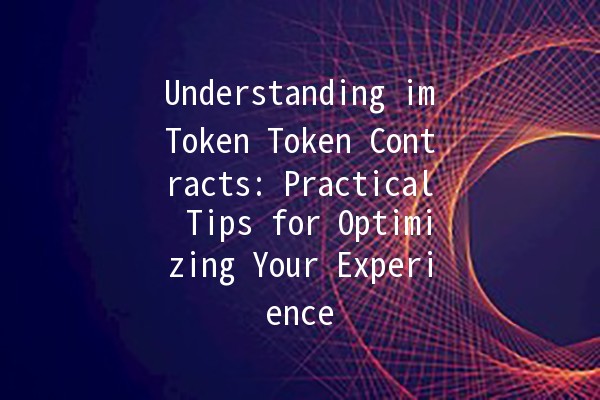In the rapidly evolving world of cryptocurrencies, managing and trading digital assets can be complex. One of the crucial components in this ecosystem is token contracts, especially within the imToken wallet. This article will provide insights into imToken token contracts and offer practical tips for enhancing your experience with them.
imToken is a popular digital wallet that supports various cryptocurrencies and tokenized assets. Token contracts are smart contracts that govern the issuance, transfer, and management of tokens on a blockchain. These contracts ensure security and transparency in transactions and allow users to interact with decentralized applications (dApps).

Token contracts play a vital role in the cryptocurrency ecosystem by ensuring seamless transactions. They manage the rules for token distribution, ownership, and transfer. Understanding these contracts can help users make informed decisions and optimize their interactions with digital assets.
Familiarizing yourself with token standards like ERC20 (for fungible tokens) and ERC721 (for nonfungible tokens) is essential. Each standard has its own rules and functionalities that dictate how tokens behave.
Example Application: If you're planning to participate in a token sale, check if the token follows ERC20 standards. This ensures broader compatibility with wallets and exchanges.
imToken allows users to manage multiple tokens from different networks. Use its features to track and organize your assets efficiently.
Example Application: Create separate portfolios within imToken for different investment strategies (e.g., longterm holding vs. active trading). This will give you a clearer view of your investments and performance.
Explore the dApp browser within imToken to access new services and protocols. Many dApps offer functionalities that enhance your token management experience.
Example Application: Use decentralized exchanges (DEXs) available in imToken to swap tokens without the need for a centralized intermediary, minimizing trading fees and delays.
Before investing in any token, scrutinize vital metrics such as market cap, trading volume, and historical performance.
Example Application: Utilize imToken’s analytics tools to assess a token's price trends and market behavior. This data helps in making informed decisions about buying, holding, or selling tokens.
Security is paramount when handling cryptocurrencies. Follow best practices to protect your tokens and private keys.
Example Application: Enable twofactor authentication (2FA) in your imToken wallet. Regularly update your recovery phrases and avoid accessing your wallet on public WiFi to mitigate security risks.
Token contracts manage the rules for token distribution, ownership, and transfer. They ensure the integrity and functionality of tokens on the blockchain, governing how they can be created, traded, and interacted with.
You can find the token contract address on the official website of the token project or through popular blockchain explorers like Etherscan. Always verify the address to avoid scams.
While imToken primarily serves as a wallet for existing tokens, you can create your own token through platforms like Ethereum or Binance Smart Chain, which provide tools for smart contract development.
If a token contract is compromised, it typically requires swift action from the developers to implement security measures. Users may need to move their assets to a secure location if necessary.
Tokens must follow specific standards (e.g., ERC20 or ERC721) to be recognized by imToken. If they meet these standards, they should automatically appear in your wallet.
Recovering tokens sent to the wrong address can be complex and is often not possible. Always doublecheck addresses before transfers. For further assistance, contact imToken support.
By understanding and utilizing imToken’s token contracts effectively, along with the above practical tips, you can elevate your experience in the cryptocurrency landscape. Dive into the world of digital tokens with confidence and clarity!